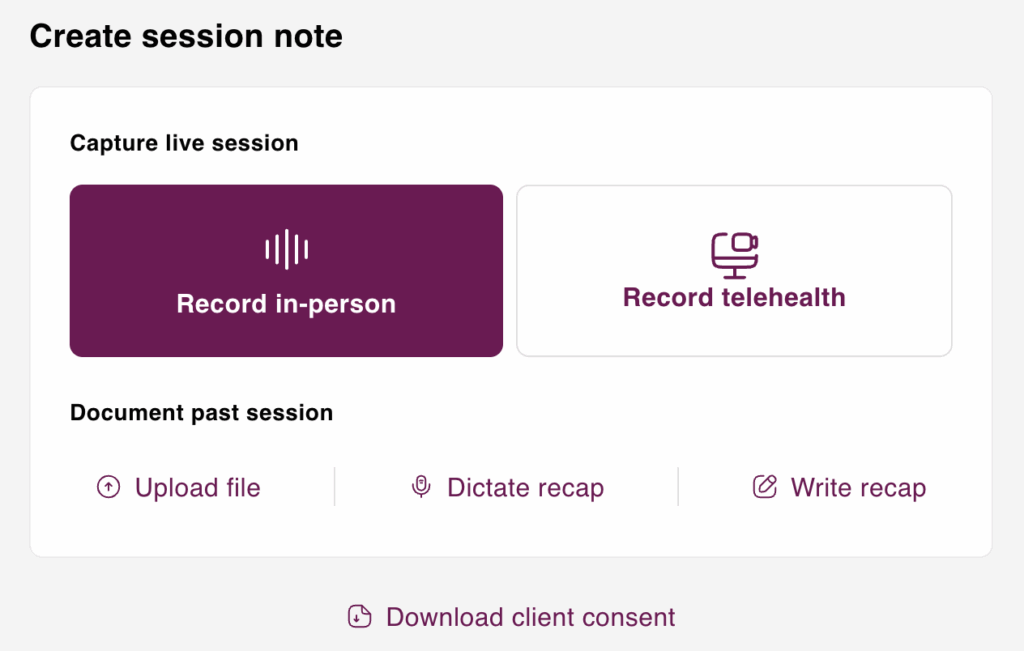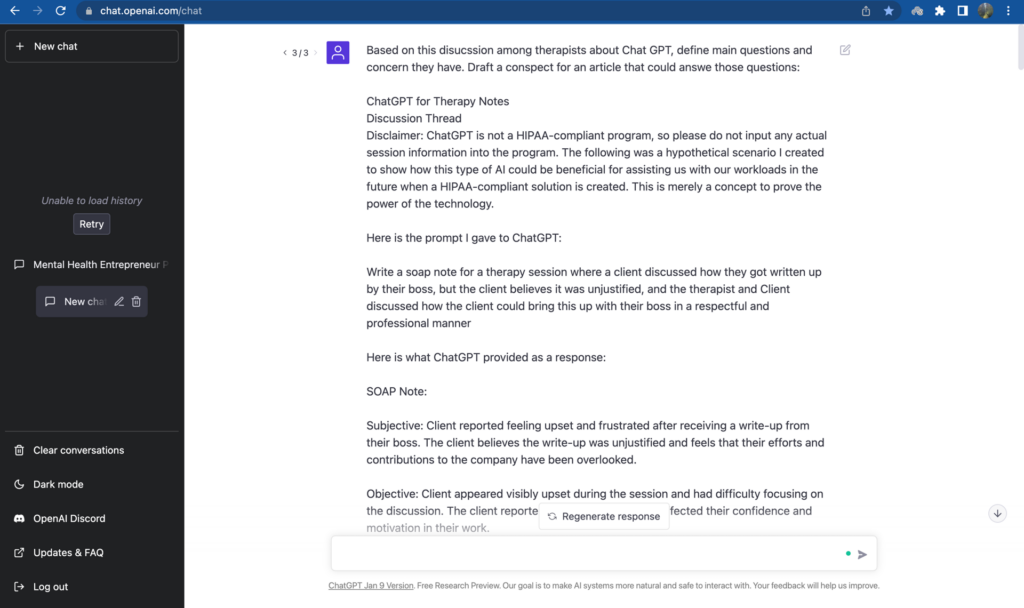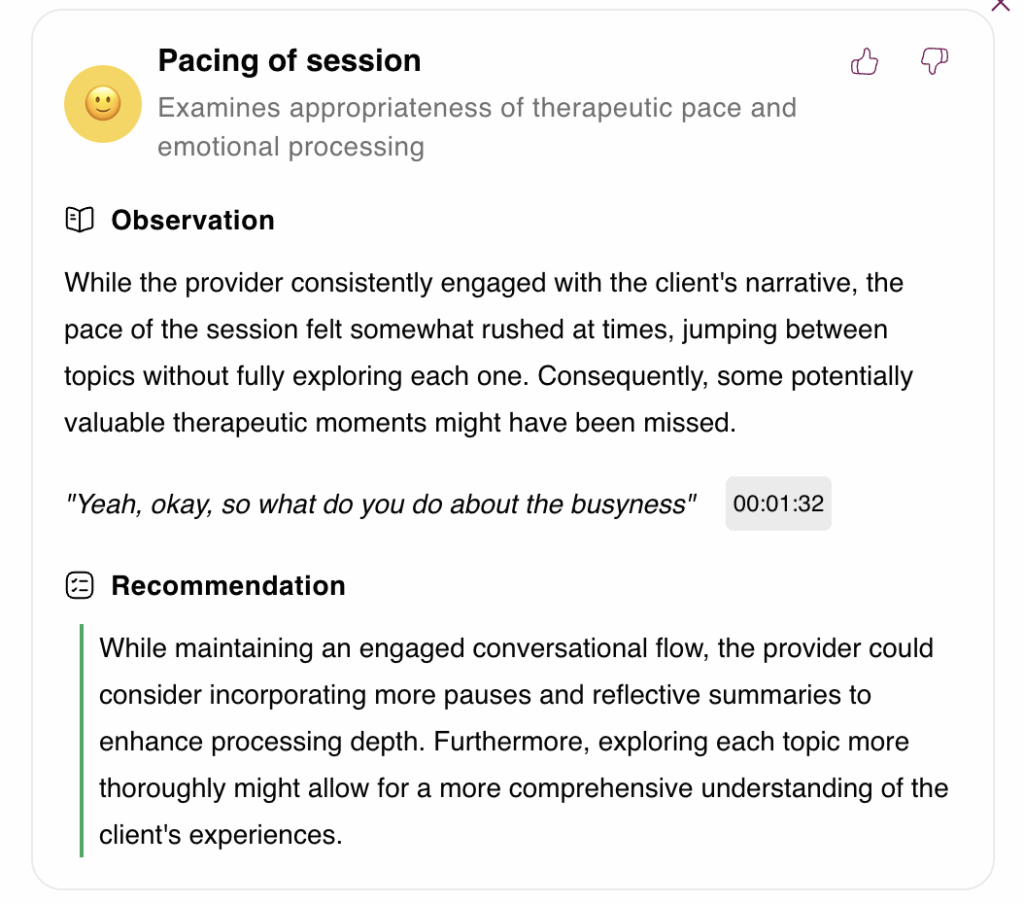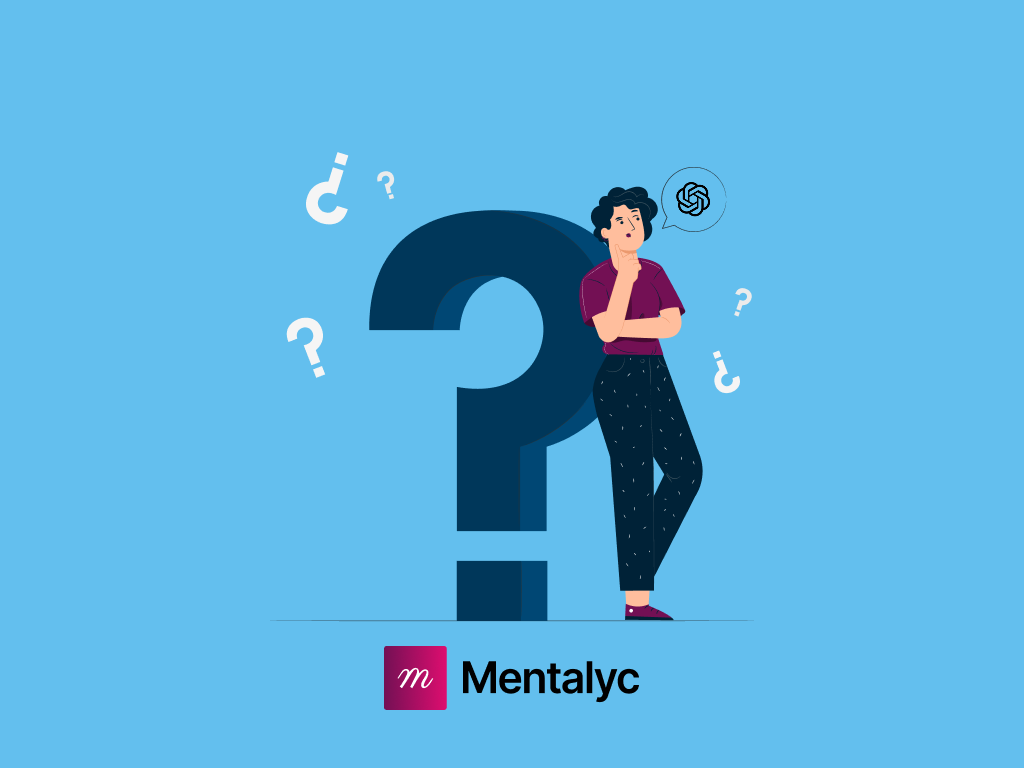The use of AI in therapy is an emerging field, and one application that has been discussed among therapists is the use of ChatGPT for therapy notes. While the idea of using AI to assist with the tedious task of writing therapy notes is appealing, there are also concerns about the ethics and legality of using a non-HIPAA-compliant program in therapy. This article aims to explore the potential benefits and limitations of his article aims to explore the potential benefits and limitations of using ChatGPT psychotherapy documentation and to address the main questions and concerns that therapists have about this technology.
What is ChatGPT?
ChatGPT is a language-generation AI model that can generate human-like text based on a given prompt. It has been used in various applications such as content writing, chatbots, and even poetry. However, its potential use in therapy is a relatively new concept.
The Magic of ChatGPT: How AI Is Changing Therapy Note-Taking
And now guess what? The 2 paragraphs above were written by ChatGPT itself! How come? Let me tell you a story.
A friend of mine recently sent me a Reddit thread regarding ChatGPT for therapy notes. I thought it is a great topic to write about considering it’s a very similar type of technology to what we use at Mentalyc. As the CEO of the company providing AI notes to therapists, I’m speaking with clinics every day about how AI can help therapists take notes, we discuss the benefits of such technology and potential risk.
I regularly receive emails from our users offering valuable feedback and suggestions for enhancing the AI-generated therapy notes they use. I also use GPT models to facilitate my work. Like in this article, I got ChatGPT to help me out. I will show you how, but let’s first go over the basics:
How does ChatGPT work?
ChatGPT works by using transformer models to understand the context and meaning of language, as well as relationships between words. This allows it to generate text that is more natural and human-like. For example, if given a prompt about a therapy session, it will understand the context of the conversation and generate a note that is somewhat similar to what a therapist would write. This illustrates how emerging AI tools for therapists can support the documentation process.
However, as it is currently designed, it should not be used as a therapy AI scribe due to ethical and practical considerations. To effectively serve this role, a combination of a fine-tuned GPT model that has been specifically trained in therapeutic language, conversation, and other machine learning algorithms is necessary to ensure accuracy and confidentiality in automated therapy note-taking.
What are Transformer Models?
Transformer-based language models, such as GPT-3, use statistical patterns learned from large amounts of text data to predict the most likely next word in a given context.
Simply put, GPT-3 is a transformer-based language model developed by OpenAI, and ChatGPT is a specific application of an improved version of GPT-3, which is GPT-3.5, also developed by OpenAI, which has been fine-tuned for conversational language processing.
However, when it comes to psychotherapy note-taking, a model like GPT-3, and by extension, ChatGPT, would only be as accurate as the data it has been trained on. This is why specialized AI therapy documentation software is required for clinical settings.
ChatGPT is not intended to serve as a therapy AI scribe, and poses clear ethical and practical risks if used that way.To safely support clinicians, an AI note-taking for mental health professionals tool would need to be carefully trained in therapeutic language and built with extra safeguards to ensure accuracy and protect client confidentiality.
That’s exactly what Mentalyc was built for. Unlike general-purpose AI, Mentalyc is specifically designed for therapy documentation. It uses clinical templates, therapeutic language models, and compliance-focused safeguards to generate progress notes that are both accurate and audit-ready. With HIPAA-grade security and a workflow tailored to therapists, Mentalyc helps clinicians complete notes quickly and confidently, while ensuring client privacy is always protected.

The Origin Story of ChatGPT
OpenAI released ChatGPT in November 2022 and it quickly gained popularity. At Mentalyc, we have tested various versions of the GPT models from OpenAI for our AI-based progress notes for therapists. These models come in different sizes, some of which are commercially sold by OpenAI and some are open source and can be used without additional training or can be fine-tuned for specific industries.
ChatGPT is the latest iteration of text language models from OpenAI and is currently available for public testing. The chat-like interface makes it accessible and easy to interact with, even for non-technical users. The mainstream adoption of ChatGPT became apparent in December when my cousin mentioned using it to generate sales job applications, and discussions among therapists on Reddit further demonstrate its popularity.
ChatGPT in Action: Therapist Concerns About Using AI for Clinical Documentation
To quickly understand what therapists’ beliefs are when it comes to ChatGPT, I copied and pasted a Reddit conversation among therapists on ChatGPT’s interface and asked it to tell me what are the main questions and concerns of therapists from that thread. As simple as that! Let’s see what we got:

Output
Main Questions and Concerns:
- Can ChatGPT be used to assist therapists with their workloads in the future, particularly in writing therapy notes?
- Is ChatGPT a HIPAA-compliant program, and if not, what are the obstacles that need to be overcome to make it ethical and legal to use in therapy?
- How does the quality of therapy notes produced by ChatGPT compare to those written by therapists?
- Will AI ever replace human therapists in providing therapy services?
Pretty accurate, isn’t it?
The second part of the task involved creating a summary of this article. The ChatGPT did a commendable job, but some modifications and additions were necessary for accuracy. With its assistance, the task was completed much faster than it would have been without its help.
The same applies to therapists who use Mentalyc for writing therapy progress notes. The technology significantly reduce the amount of time spent on each note. On average, therapists using Mentalyc take just 3 minutes to write each progress note, while those who do it manually can take anywhere from 15 to 20 minutes. This shows the power of progress note automation in practice.
I believe this is the future of many fields including mental health, and therapists should understand it well enough to be able to make a conscious choice of which tool they can use in their practice. There is no question that this type of technology, including GPT-3 in psychotherapy, will be used and will become better, so avoiding it is counterproductive. Now let’s see how it can be used safely, highlighting the ChatGPT benefits for therapists.
Benefits vs Limitations of ChatGPT in Therapy Note-Taking
| Benefits of ChatGPT | Limitations of ChatGPT |
| Saves time by reducing manual note-writing workload | Not HIPAA compliant, posing privacy and legal risks |
| Provides consistent structure and formatting for therapy notes | May generate inaccurate or incomplete notes that need review |
| Helps non-native English speakers with clear, professional documentation | Limited ability to capture client nuances, emotions, or therapist insights |
| Useful for templates, brainstorming, and training purposes | Raises ethical concerns in psychotherapy since AI cannot replace human empathy |
| Increases efficiency, allowing more focus on client care | Cannot securely store or process data |
Benefits of Using ChatGPT for Therapy Notes
According to ChatGPT, using AI for therapy note generation can offer multiple benefits, including:
- Efficient Time Management: Generating therapy notes manually can be a tedious and time-consuming process. ChatGPT can simplify this task, thereby freeing up more time for therapists to focus on their patients.
- Consistent and Comprehensive Documentation: AI-generated notes are more likely to be consistent in terms of format and language, helping to ensure that important information is captured and recorded accurately.
- Bridging the Language Gap: For therapists who are not native English speakers, writing notes in English can be a challenge. ChatGPT provides a solution by assisting in generating notes in clear, concise, and effective English.
Note: It is important to note that the accuracy of the notes generated by ChatGPT is dependent on the quality and completeness of the training data it was trained on, as well as the context of the input provided.
Drawbacks of Using ChatGPT for Therapy Notes
As per the discussion on a Reddit thread, ChatGPT faces several limitations when it comes to therapy note generation:
- Lack of HIPAA Compliance: ChatGPT is not designed to meet the strict security standards set by HIPAA regulations. This means that actual session information cannot be inputted or processed using ChatGPT, making it unsuitable for use in a clinical setting and raising concerns about the legal and ethical risks of ChatGPT in therapy.
- Note Quality: While ChatGPT can generate notes that resemble those written by therapists, the quality of the notes may not be up to par. There is a risk of inaccuracies or missing information, requiring therapists to review and edit the notes before they can be used, which limits its utility as a mental health documentation tool.
- Limited Role in Therapy: It’s essential to understand that AI, including ChatGPT, cannot replace human therapists. ChatGPT can assist therapists in writing notes, but it cannot provide the human connection and empathy that are fundamental to the therapeutic process.
AI-Powered Alternative for Psychotherapists
Mentalyc is a specialized AI scribe designed to meet the unique needs of psychotherapists. Utilizing advanced NLP techniques, including GPT models, to streamline the note-taking process by automatically generating detailed, personalized notes from pre-recorded therapy sessions. With Mentalyc, therapists can focus on their clients rather than manually taking notes, making it one of the most effective AI-based psychotherapy documentation solutions.
But Mentalyc goes far beyond just note-taking. It offers supervision-like feedback to help therapists reflect on their sessions, automatically generates intake forms and treatment plans that align with clinical standards, and even tracks client progress over time. With these features, Mentalyc becomes not just a documentation tool, but a partner in improving care quality, supporting compliance, and strengthening therapeutic outcomes.

Benefits of Mentalyc for Therapy Documentation, As Reported by Therapists:
- Streamlined Insurance Compliance:Mentalyc generates notes that are well-structured and customized to each therapy session, reducing the risk of messy notes or duplication of information. The AI system ensures that all the necessary information is captured to meet insurance requirements to prove medical necessity, freeing therapists from the added worry.
- Improved Case Formulation:Consistent and comprehensive notes generated by Mentalyc make it easier for therapists to track client progress and maintain a clear understanding of their story.
- Augmented Therapy Experience:Mentalyc provides therapists with different perspectives and insights, enhancing their awareness and overall therapy experience.
- Increased Focus on the Client: Mentalyc AI-powered therapy documentation solution allows therapists to stay fully present with their clients, without having to switch tabs or interrupt the session to document notes.
- Accommodating for Disabilities: Users with disabilities, such as carpal tunnel syndrome, have reported finding Mentalyc to be a lifesaver, reducing the strain on their hands while generating notes.
- Empowering for Neurodiverse Therapists:Mentalyc has received positive feedback from therapists with neurodiverse conditions, such as ADHD, who appreciate the assistive technology and the improved therapy experience it provides.
Mentalyc vs ChatGPT for Therapy Notes: Comparison between Mentalyc and ChatGPT
| Feature | ChatGPT | Mentalyc |
| Purpose | General-purpose AI text generator | Specialized AI-based psychotherapy documentation solution |
| HIPAA Compliance | ❌ Not compliant | ✅ Fully compliant |
| Accuracy | May miss clinical details; requires therapist edits | Designed for therapy; generates clinically accurate, structured notes |
| Progress Note Automation | Partial – needs therapist input and review | Full automation from transcripts/audio |
| Security | Data not encrypted for medical use | Secure, encrypted, healthcare-grade compliance |
| Ease of Use | Flexible for general tasks, but not tailored for therapy | Built for therapists; intuitive, tailored note-taking |
| Ethical AI Use | Risky due to privacy and legal/ethical risks | Aligned with clinical standards |
| Best For | Drafting templates, training, brainstorming ideas | Clinical documentation, progress notes, and insurance compliance |
- Mentalyc operates in a similar manner to ChatGPT, converting therapy transcripts into notes, but with a key distinction – Mentalyc is specifically designed for therapy and therefore performs this task with greater accuracy and efficiency compared to the general-purpose ChatGPT.
- In contrast, Mentalyc is fully HIPAA compliant, ensuring secure handling of sensitive client information, something that is critical in the field of psychotherapy.
- Mentalyc also processes audio recordings of the therapy sessions without having the therapist independently generate session transcripts as is the case with using ChatGPT.
Conclusion: The Future of AI Therapy Notes and HIPAA-Compliant Documentation
ChatGPT may seem useful for speeding up therapy note-taking and making documentation more consistent. However, its non-compliance with HIPAA regulations is a significant concern. Beyond privacy risks, it lacks the clinical training needed to produce accurate, audit-ready notes, struggles with therapeutic terminology, and cannot guarantee the confidentiality standards required in mental health care. In addition, its general-purpose design means it often generates vague or inaccurate language, leaving clinicians responsible for heavy editing and potential liability.
To address these limitations, therapists need tools created specifically for psychotherapy—like Mentalyc. It’s fully HIPAA-compliant, built for clinical documentation, and trained in therapeutic language. Unlike general AI, Mentalyc produces structured, audit-ready notes that meet insurance requirements and ease documentation stress. By turning session recordings into clear, accurate notes, it saves hours each week while keeping client data secure. AI can’t replace human therapists, but with Mentalyc it can take care of the paperwork so clinicians can focus on their clients. This points toward the future of AI in mental health care.
As the ethical AI use in therapy continues to evolve, it is crucial to consider both ethical and legal implications. If you have any further questions or concerns regarding ChatGPT, Mentalyc, and concepts about AI and therapy notes, please don’t hesitate to reach out here.
Benjamen Saenz, Licensed Professional Counselor:
“The accuracy and the clinical way that the notes are written are just… fantastic. The quality still shocks me to this day. Like the names of certain disorders, the names of pharmaceuticals that people are taking get them perfect almost every single time. … Mentalyc takes the guesswork out of that and has just allowed me to enjoy my job way more.”
Sophia Bakker, Temp Licensed Professional Counselor:
“Before I was working with Mentalyc, I had severe problems with keeping up with my notes. (…) The notes give me insights that help me conceptualize my clients better. I kind of feel like I have a little mini supervisor going with me everywhere I go.”
Disclaimer: All examples of mental health documentation are fictional and for informational purposes only.
Mentalyc AI Pricing & Plans
| Plan | Price | Key Features |
| 14-Day Free Trial | $0 | 14 days of full PROaccess, including 15notes—no credit cardrequired. |
| Mini | USD 14.99 /month | Record in-personsessions, upload audiofiles, use voice-to-text,or type notes directly, etc |
| Basic | USD 29.99 /month | Everything in Mini, plus:Alliance Genie™ NEW!(limited access), Smart TP™ |
| Pro | USD 59.99 /month | EMDR, Play andPsychiatry modalities,100+ custom templatesincld. BIRP, PIRP, GIRP, PIE, and SIRP,Auto-computed CPTcodes |
| Super | USD 99.99 /month | Everything in Pro, plus:Group therapy notes foreach group member,Priority onboarding andsupport |
For more details, visit the pricing page on our website.
Frequently Asked Questions (FAQs) About ChatGPT for Therapy Notes
Why other mental health professionals love Mentalyc

“By the end of the day, usually by the end of the session, I have my documentation done. I have a thorough, comprehensive note … It’s just saving me hours every week.”
CDCII

“Having Mentalyc take away some of the work from me has allowed me to be more present when I’m in session with clients … it took a lot of pressure off.”
LPC

“A lot of my clients love the functionality where I can send them a summary of what we addressed during the session, and they find it very helpful and enlightening.”
Therapist

“It’s so quick and easy to do notes now … I used to stay late two hours to finish my notes. Now it’s a breeze.”
Licensed Professional Counselor







